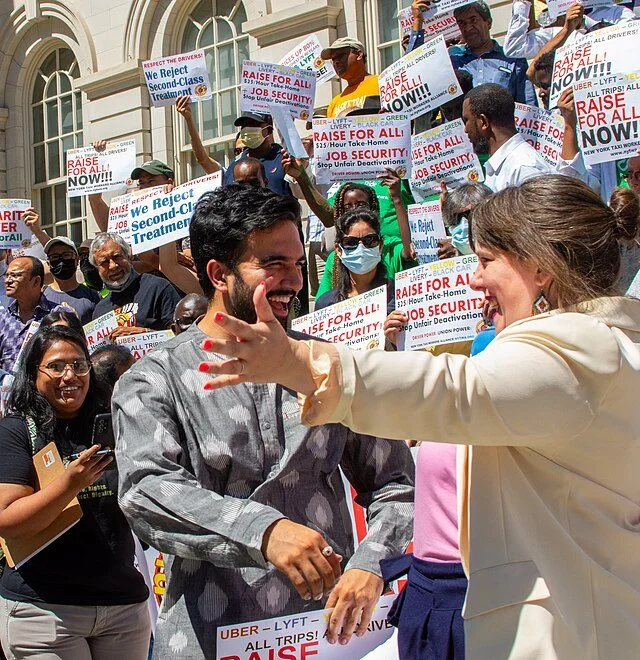Zohran Mamdani and Zack Polanski in a World Turning Right
Image credit: InformedImages via Wikimedia
As far-right politics tightens its grip on public life, from Trump’s defiance of democratic norms in America to Farage’s comeback in Britain, it’s easy to feel that progressive politics has been cornered. Yet, the rise of figures like Zohran Mamdani in New York, and Zack Polanski in the UK, suggests something different: even in an age of cynicism, boldness and authenticity can still capture imaginations.
When Mamdani, a 34-year-old democratic socialist and the son of Ugandan and Indian immigrants, won the New York mayoral race, he did so despite the combined force of party machinery, billionaire hostility, and the conservative media. The New York Post dismissed his campaign as the product of “engineered voting rules,” whilst right-wing pundits warned that his plans to tax the rich and freeze rents would “drive people out of New York.”. Conservative commentators mocked his win, calling his transit plan “socialist madness on wheels” and warning that his agenda could drive New York into ruin.
And yet, voters rejected this narrative. As The Observer noted, Mamdani’s campaign wasn’t powered by establishment consultants or corporate donors but by “an insurgent movement” rooted in tenants’ rights, “grassroots energy,” and “social media fluency”. Turnout surged to record levels, particularly among under-30s, thanks to a campaign that was as comfortable quoting Marx as it was making viral videos on Instagram and TikTok.
Here in the UK, Zack Polanski, the Green Party leader, has been waging a parallel battle: not for the mayoralty of the world’s financial capital, but for legitimacy in a system designed to keep smaller parties invisible. His politics are less socialist than Mamdani’s and more “eco-populist” as the BBC put it, rooted in climate justice and social renewal, but the energy feels similar.
For Polanski, the link between social media visibility and organisational growth is striking. Since his leadership of the Green Party of England and Wales, the party’s membership has surged, from roughly 70,000 to well over 140,000 in a matter of weeks.
Much of this rise correlates with his increased media appearances, viral social media content, and campaign videos that lean into bold, clear messaging. Both men blend moral seriousness with an unapologetically online edge - at ease sparring with opponents and speaking the language of ordinary anger.
Polanski has, of course, faced his own backlash - enduring everything from sneering tabloid mockery about his appearance to absurd accusations that his policies are “dangerous.” Recently, he argued that these attacks reveal “a political and media establishment rattled by a party growing fast and willing to say the unsayable”, that our country has been hijacked by those interested only in serving the super-wealthy.” The reaction, he said, only proved that hope still threatens power.
Unsurprisingly, both Mamdani and Polanski have become lightning rods for establishment anxiety. In the U.S., Mamdani is seen as an experiment, a “replicable model” with the right already attempting to prevent “the rise of local Mamdanis.” Here in the UK, Polanski’s polling surge has been treated as an anomaly, despite his party briefly overtaking Labour in late October. The pattern is unmistakable: when charisma and left-wing politics collide, elites move quickly to dismiss it as unserious, unsustainable, or un-British.
What both men understand, and what unites them beyond ideology, is the necessity of narrative.
The modern right has mastered the art of storytelling through anger and identity, while the left mistakes moral correctness for emotional connection. Mamdani and Polanski don’t fall into that trap. They meet voters where they are, in the emotional terrain of struggle and aspiration. They speak in full sentences, not slogans. They make politics feel human again.
This doesn’t make them flawless. Both face serious challenges ahead: Mamdani must govern a city that has long punished radicals, while Polanski must navigate a British media environment which seems allergic to optimism.
Even their presence is subversive. When Farage and Trump define the zeitgeist through fear-mongering, figures like Mamdani and Polanski insist that hope is not naïve; it’s strategic.
Their appeal lies partly in how they embody resistance to the collapse of political imagination. Polanski’s Greens channel the same frustration in a different idiom: a rejection of “GDP worship,” and a belief that wellbeing should replace growth as the measure of success. Both see politics not as a management exercise, but as moral storytelling.
Critics accuse them of utopianism, though in a world of climate collapse, unaffordable cities, and widening inequality, the real utopians are those who believe the status quo can hold.
Mamdani’s victory against the odds, against the money, against the noise, has already sent ripples through global progressive movements. At its core, the deeper lesson from New York isn’t about the left or right - it’s about courage. In an era when charisma has been monopolised by demagogues, Mamdani and Polanski demonstrate that it can also be wielded by those fighting for fairness. They don’t whisper policy; they narrate purpose.
Both men are refusing to be silenced by the machinery of fear. They stand as reminders that even amid the global drift toward authoritarianism, politics can still be a contest of imagination, and that the most radical act in dark times is to believe that something better is still possible.

